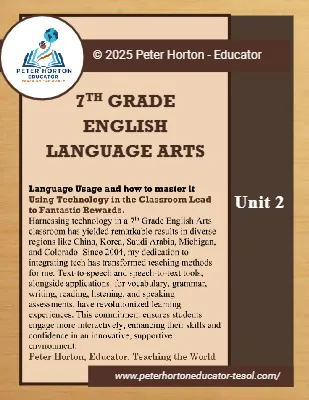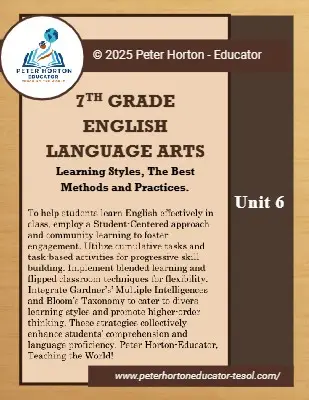7th English Language Arts Unit 14
General English, Why is Grammar Important?
General English is like the foundation of building a house. It helps us communicate, share ideas, and understand each other. Grammar, on the other hand, is like the blueprint that guides us in using words correctly. Without grammar, our sentences might not make sense, and it would be hard to understand one another. So, learning grammar is essential because it helps us write clearly, speak accurately, and become better at expressing our thoughts and feelings.
Unit 14 General English
Why Learn English?
English is not just another subject in school; in fact, it’s a gateway to the world! Moreover, as the most widely spoken language globally, English connects you to millions of people, books, movies, and cultures. For instance, for a 7th grader, mastering English means unlocking unlimited adventures. Imagine reading your favorite stories without struggling, or watching movies without subtitles. Additionally, being great at English boosts your confidence, helps in other subjects, and opens doors to future opportunities. Furthermore, it sharpens your thinking and creativity. Therefore, dive into learning English, and you’ll discover a world full of interesting and exciting possibilities!
25 Most Important Things to Learn When Learning English for a 7th Grade Student
An Engaging Guide for Young Learners
Learning English can be an exciting adventure, especially for a 7th grade student! Hence, here’s a guide to help you navigate through the 25 most important things you need to learn, explained in a fun and engaging way.
Building a Strong Vocabulary
Description: Expanding your vocabulary is like adding colors to your artist’s palette. It allows you to express yourself more vividly.
Example: Instead of saying “happy,” you can say “ecstatic” or “joyful.”
Understanding Grammar Basics
Description: Grammar is the backbone of any language. In particular, it helps you form correct sentences.
Example: Knowing the difference between “their,” “there,” and “they’re.”
Mastering Verb Tenses
Description: Verb tenses allow you to talk about the past, present, and future.
Example: “I walked,” “I walk,” and “I will walk.”
Writing Clear Sentences
Description: Learn to write complete sentences that clearly express your thoughts.
Example: “The cat sat on the mat.”
Reading Comprehension
Description: Being able to understand what you read is crucial. Therefore, practice by reading books, stories, and articles.
Example: After reading a paragraph, summarize it in your own words.
Spelling
Description: Correct spelling ensures your writing is easily understood.
Example: “Friend” instead of “freind.”
Punctuation
Description: Punctuation marks like commas and periods help clarify meaning.
Example: “Let’s eat, grandma!” vs. “Let’s eat grandma!”
Sentence Structure
Description: Understand how to structure sentences correctly.
Example: Subject + Verb + Object (e.g., “She loves apples.”)
Using Conjunctions
Description: Conjunctions like “and,” “but,” and “or” connect ideas.
Example: “I wanted to go, but it was raining.”
Descriptive Writing
Description: Learn to add details to your writing to make it more vivid.
Example: “The bright, yellow sun shone down on the sparkling blue sea.”
Narrative Writing
Description: Create stories with a clear beginning, middle, and end.
Example: Write about a day in the life of your pet.
Writing Essays
Description: Learn to structure essays with an introduction, body, and conclusion.
Example: “My Favorite Hobby” essay.
Understanding Idioms
Description: Idioms are phrases that don’t mean exactly what they say.
Example: “It’s raining cats and dogs” means it’s raining heavily.
Learning Synonyms and Antonyms
Description: Synonyms are words with similar meanings, and antonyms are words with opposite meanings.
Example: Synonym: “Big” and “large”; Antonym: “Big” and “small.”
Engaging in Conversations
Description: Practice speaking English with friends and family.
Example: Have a chat about your favorite movie.
Listening Skills
Description: Good listeners make great communicators. Thus, practice by listening to English songs, podcasts, or audiobooks.
Example: Listen and then summarize what you heard.
Using Homophones
Description: Homophones are words that sound the same but have different meanings.
Example: “To,” “two,” and “too.”
Understanding Prefixes and Suffixes
Description: These are added to words to change their meaning.
Example: “Unhappy” (prefix “un-“) or “happiness” (suffix “-ness”).
Practicing Pronunciation
Description: Pronounce words correctly to be understood.
Example: Practice saying “schedule” and “comfortable.”
Learning Through Games
Description: Engage in fun activities like word puzzles and language games.
Example: Play Scrabble or word search puzzles.
Writing Letters and Emails
Description: Practice formal and informal writing.
Example: Write a thank-you note to a teacher.
Understanding Context Clues
Description: Use the surrounding text to understand the meaning of new words.
Example: “The arid desert was vast and dry.” (Arid means dry.)
Cultural References
Description: Learn about English-speaking cultures to understand context.
Example: Know about holidays like Thanksgiving.
Using Technology
Description: Use educational apps and websites to practice English.
Example: Duolingo or Grammarly.
Finding Joy in Learning
Description: Most importantly, have fun and enjoy the process of learning English.
Example: Read your favorite English books or watch movies with subtitles.
Remember, learning a new language takes time and practice, and with these 25 steps, you’ll be well on your way to mastering English!
Two of the major parts of learning English are vocabulary (words) and grammar; therefore, it is a great place to start!
What is Grammar?
Grammar is the system of rules governing language use. Specifically, learning grammar is crucial for clear communication, understanding, and constructing sentences. Moreover, it helps students write correctly, read with comprehension, and express ideas effectively in English class.
The nine parts of speech are the building blocks of language: nouns name things, pronouns replace nouns, verbs show action, adjectives describe nouns, adverbs modify verbs, prepositions link words, conjunctions connect clauses, interjections express emotion, and articles define nouns. Consequently, they structure our sentences and convey meaning.
The Importance of Grammar
Introduction
Grammar is the rules and conventions governing how we use language to communicate. Indeed, grammar helps us to express our thoughts clearly, accurately, and effectively. Additionally, it allows us to understand what others are saying or writing. For example, grammar helps us avoid misunderstandings and confusion. If we say, “I saw a man on a hill with a telescope,” we might mean that we used a telescope to see a man on a hill, that we saw a man who had a telescope on a mountain, or that we saw a man who was on a hill with a telescope. Grammar helps clarify meaning using punctuation, word order, and other devices.
Furthermore, grammar helps us show respect and courtesy to others. If we say, “Please close the door,” we are using a polite and respectful tone, whereas if we say, “Close the door,” we are using a rude tone. Hence, grammar helps us choose the appropriate words, tone, and mood for different situations and audiences.
Moreover, grammar helps us demonstrate our knowledge and skills. For example, if we write an essay for school, we must use correct grammar, spelling, and punctuation. Grammar helps us show that we have learned and mastered the rules and conventions of the language. In addition, it also helps improve our vocabulary, reading, and writing skills.
How Can Grammar Benefit Us?
Grammar can benefit us in many ways. First, it can help us communicate more effectively. By using correct grammar, we can convey our messages more clearly and precisely. Consequently, we can avoid miscommunication and ambiguity that might cause confusion or misunderstanding. For instance, if we write “Let’s eat, Grandma,” we invite our grandmother to join us for a meal, whereas if we write “Let’s eat Grandma,” we suggest that we want to eat our grandmother. Grammar helps us use commas and other punctuation marks to separate and organize our sentences.
Secondly, grammar can help us impress others. By using correct grammar, we can show that we are educated, intelligent, and professional. Similarly, we can create a positive impression on others, such as teachers, employers, and friends. For example, if we write a resume for a job application, we want to use correct grammar, spelling, and punctuation to show that we are qualified, competent, and reliable.
Finally, grammar can help us enjoy language more. By using correct grammar, we can appreciate the beauty and richness of language. Also, we can explore the variety and diversity of languages, such as different dialects, accents, and styles. For example, if we read a poem, we can enjoy the rhythm, rhyme, and imagery that the poet uses to create a mood and a message. Grammar helps us understand the structure and meaning of the poem.











